Roberts A.D. The Cambridge History of Africa, Volume 7: from 1905 to 1940
Подождите немного. Документ загружается.

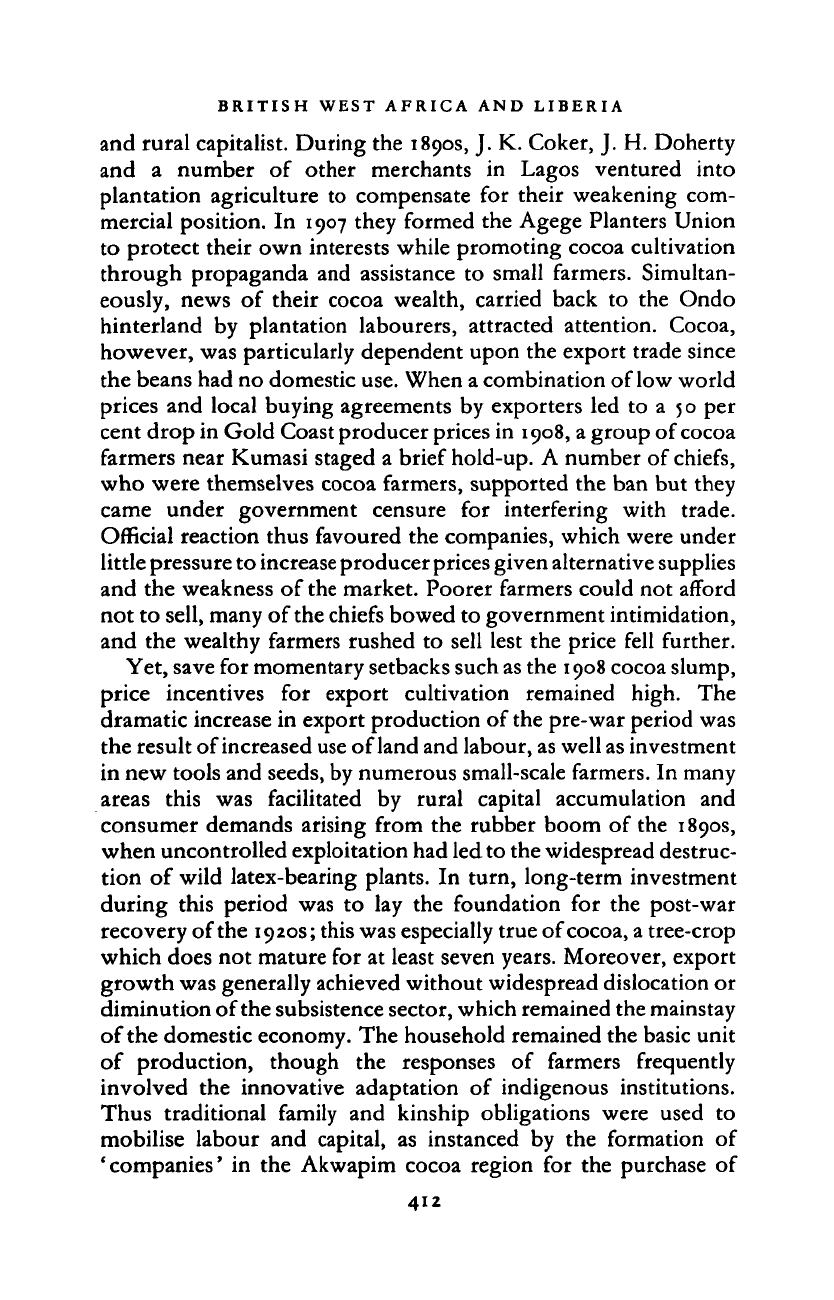
BRITISH WEST AFRICA AND LIBERIA
and rural capitalist. During the 1890s, J. K. Coker, J. H. Doherty
and
a
number
of
other merchants
in
Lagos ventured into
plantation agriculture
to
compensate for their weakening com-
mercial position. In 1907 they formed the Agege Planters Union
to protect their own interests while promoting cocoa cultivation
through propaganda and assistance
to
small farmers. Simultan-
eously, news
of
their cocoa wealth, carried back
to
the Ondo
hinterland
by
plantation labourers, attracted attention. Cocoa,
however, was particularly dependent upon the export trade since
the beans had no domestic use. When a combination of low world
prices and local buying agreements by exporters led to
a
50 per
cent drop in Gold Coast producer prices in 1908, a group of cocoa
farmers near Kumasi staged a brief hold-up. A number of chiefs,
who were themselves cocoa farmers, supported the ban but they
came under government censure
for
interfering with trade.
Official reaction thus favoured the companies, which were under
little pressure to increase producer prices given alternative supplies
and the weakness of the market. Poorer farmers could not afford
not to sell, many of the chiefs bowed to government intimidation,
and the wealthy farmers rushed to sell lest the price fell further.
Yet, save for momentary setbacks such
as
the 1908 cocoa slump,
price incentives
for
export cultivation remained high.
The
dramatic increase in export production of the pre-war period was
the result of increased use of land and labour, as well as investment
in new tools and seeds, by numerous small-scale farmers. In many
areas this was facilitated
by
rural capital accumulation
and
consumer demands arising from the rubber boom of the 1890s,
when uncontrolled exploitation had led to the widespread destruc-
tion of wild latex-bearing plants. In turn, long-term investment
during this period was
to
lay the foundation for the post-war
recovery of the 1920s; this was especially true of cocoa, a tree-crop
which does not mature for at least seven years. Moreover, export
growth was generally achieved without widespread dislocation or
diminution of the subsistence sector, which remained the mainstay
of the domestic economy. The household remained the basic unit
of production, though
the
responses
of
farmers frequently
involved the innovative adaptation
of
indigenous institutions.
Thus traditional family and kinship obligations were used
to
mobilise labour and capital,
as
instanced
by
the formation
of
'companies'
in
the Akwapim cocoa region for the purchase of
412
Cambridge Histories Online © Cambridge University Press, 2008
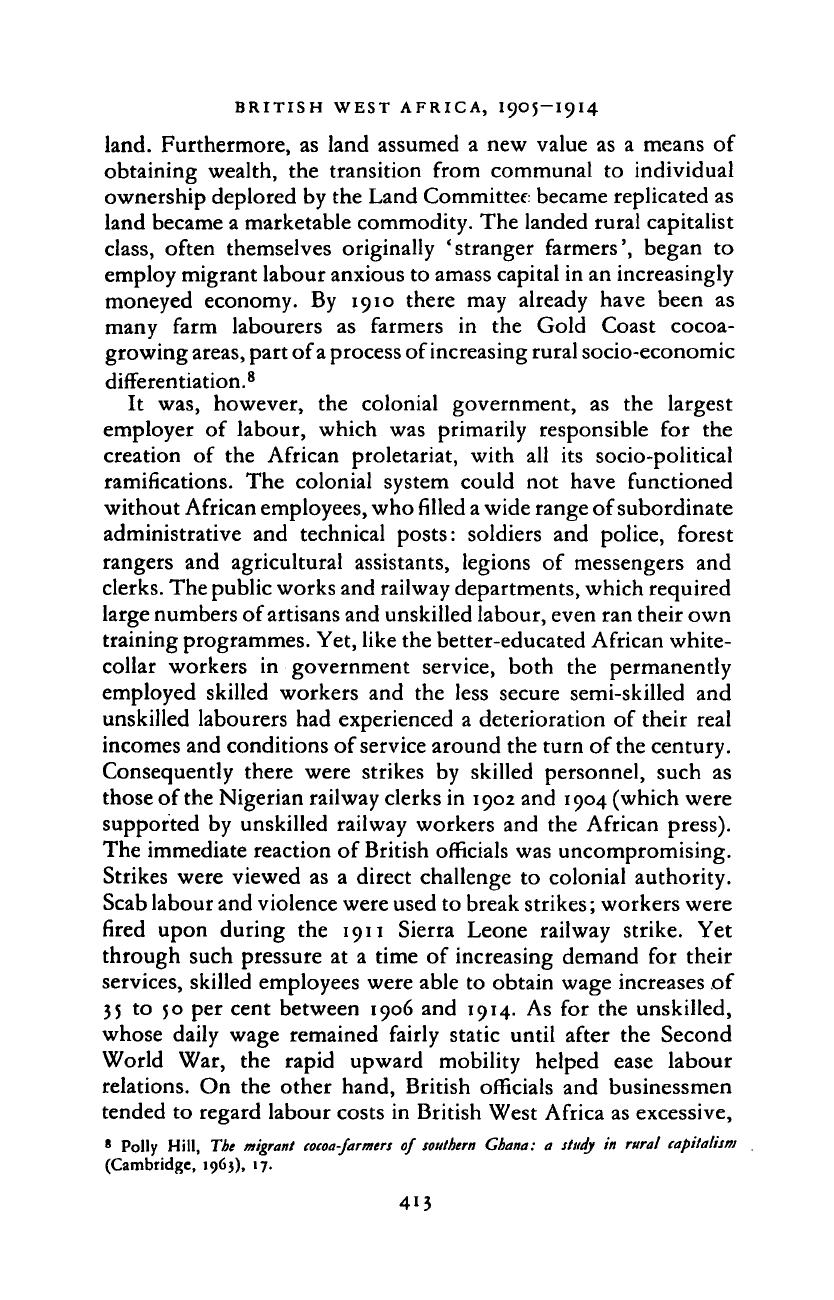
BRITISH WEST AFRICA, I905-I914
land. Furthermore, as land assumed a new value as a means of
obtaining wealth, the transition from communal to individual
ownership deplored by the Land Committee: became replicated as
land became a marketable commodity. The landed rural capitalist
class,
often themselves originally 'stranger farmers', began to
employ migrant labour anxious to amass capital in an increasingly
moneyed economy. By 1910 there may already have been as
many farm labourers as farmers in the Gold Coast cocoa-
growing
areas,
part of
a
process of increasing rural socio-economic
differentiation.
8
It was, however, the colonial government, as the largest
employer of labour, which was primarily responsible for the
creation of the African proletariat, with all its socio-political
ramifications. The colonial system could not have functioned
without African employees, who
filled
a
wide range of subordinate
administrative and technical posts: soldiers and police, forest
rangers and agricultural assistants, legions of messengers and
clerks. The public works and railway departments, which required
large numbers of artisans and unskilled labour, even ran their own
training programmes. Yet, like the better-educated African white-
collar workers in government service, both the permanently
employed skilled workers and the less secure semi-skilled and
unskilled labourers had experienced a deterioration of their real
incomes and conditions of service around the turn of the century.
Consequently there were strikes by skilled personnel, such as
those of
the
Nigerian railway clerks in 1902 and 1904 (which were
supported by unskilled railway workers and the African press).
The immediate reaction of British officials was uncompromising.
Strikes were viewed as a direct challenge to colonial authority.
Scab labour and violence were used to break strikes; workers were
fired upon during the 1911 Sierra Leone railway strike. Yet
through such pressure at a time of increasing demand for their
services, skilled employees were able to obtain wage increases of
35 to 50 per cent between 1906 and 1914. As for the unskilled,
whose daily wage remained fairly static until after the Second
World War, the rapid upward mobility helped ease labour
relations. On the other hand, British officials and businessmen
tended to regard labour costs in British West Africa as excessive,
* Polly Hill, The migrant cocoa-farmers of
southern
Ghana: a study in rural capitalism
(Cambridge, 1965), 17.
413
Cambridge Histories Online © Cambridge University Press, 2008
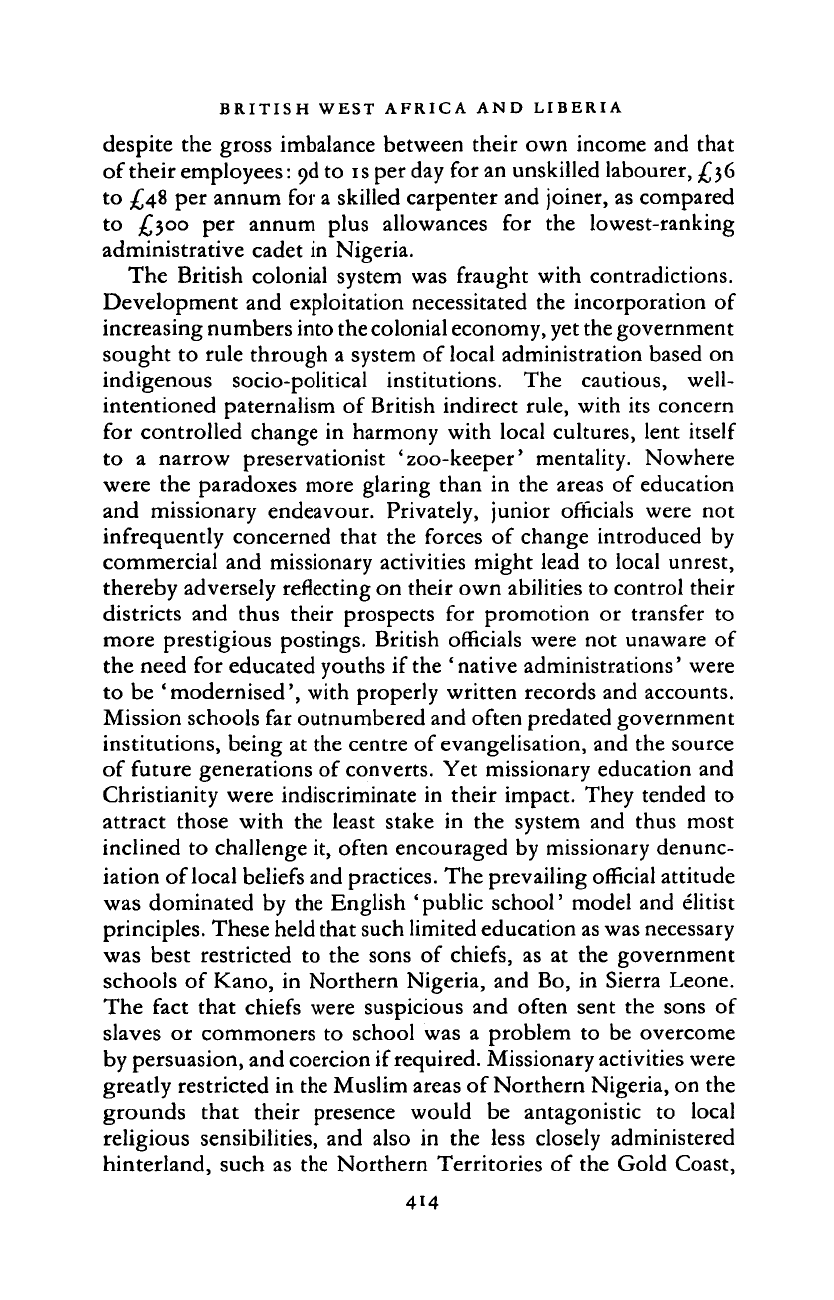
BRITISH WEST AFRICA AND LIBERIA
despite the gross imbalance between their own income and that
of their employees: yd to is per day for an unskilled labourer, £36
to £48 per annum for a skilled carpenter and joiner, as compared
to £300
per
annum plus allowances
for the
lowest-ranking
administrative cadet in Nigeria.
The British colonial system was fraught with contradictions.
Development and exploitation necessitated the incorporation of
increasing numbers into the colonial economy, yet the government
sought to rule through a system of local administration based on
indigenous socio-political institutions.
The
cautious, well-
intentioned paternalism of British indirect rule, with its concern
for controlled change in harmony with local cultures, lent itself
to
a
narrow preservationist 'zoo-keeper' mentality. Nowhere
were the paradoxes more glaring than
in
the areas of education
and missionary endeavour. Privately, junior officials were not
infrequently concerned that the forces of change introduced by
commercial and missionary activities might lead to local unrest,
thereby adversely reflecting on their own abilities to control their
districts and thus their prospects
for
promotion
or
transfer
to
more prestigious postings. British officials were not unaware of
the need for educated youths if the 'native administrations' were
to be 'modernised', with properly written records and accounts.
Mission schools far outnumbered and often predated government
institutions, being at the centre of evangelisation, and the source
of future generations of converts. Yet missionary education and
Christianity were indiscriminate in their impact. They tended
to
attract those with the least stake
in
the system and thus most
inclined to challenge it, often encouraged by missionary denunc-
iation of local beliefs and practices. The prevailing official attitude
was dominated by the English 'public school' model and elitist
principles. These held that such limited education as was necessary
was best restricted to the sons
of
chiefs, as
at
the government
schools of Kano, in Northern Nigeria, and Bo, in Sierra Leone.
The fact that chiefs were suspicious and often sent the sons of
slaves
or
commoners to school was
a
problem
to
be overcome
by persuasion, and coercion if required. Missionary activities were
greatly restricted in the Muslim areas of Northern Nigeria, on the
grounds that their presence would
be
antagonistic
to
local
religious sensibilities, and also
in
the less closely administered
hinterland, such as the Northern Territories of the Gold Coast,
414
Cambridge Histories Online © Cambridge University Press, 2008
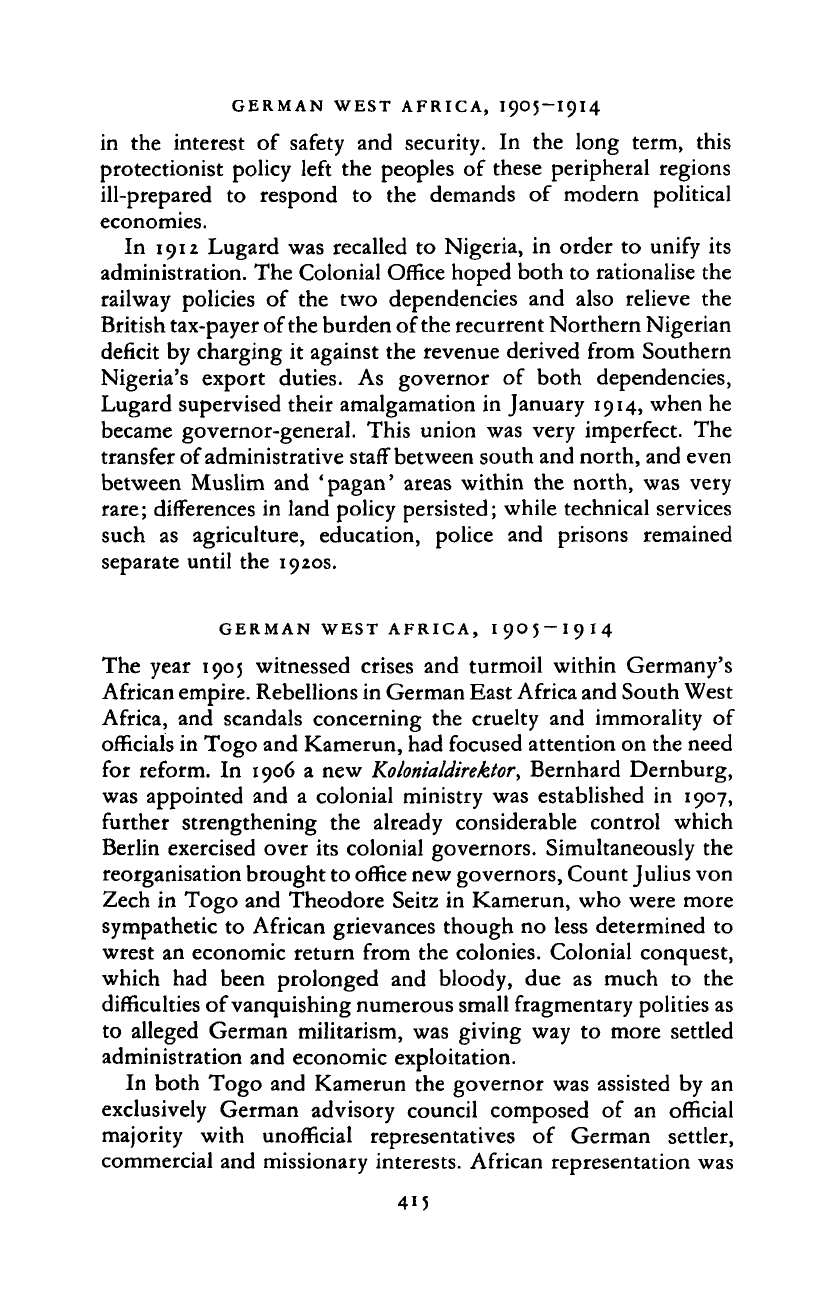
GERMAN WEST AFRICA, 1905-1914
in the interest of safety and security. In the long term, this
protectionist policy left the peoples of these peripheral regions
ill-prepared to respond to the demands of modern political
economies.
In 1912 Lugard was recalled to Nigeria, in order to unify its
administration. The Colonial Office hoped both to rationalise the
railway policies of the two dependencies and also relieve the
British tax-payer of the burden of the recurrent Northern Nigerian
deficit by charging it against the revenue derived from Southern
Nigeria's export duties. As governor of both dependencies,
Lugard supervised their amalgamation in January 1914, when he
became governor-general. This union was very imperfect. The
transfer of administrative staff between south and north, and even
between Muslim and 'pagan' areas within the north, was very
rare;
differences in land policy persisted; while technical services
such as agriculture, education, police and prisons remained
separate until the 1920s.
GERMAN WEST AFRICA, 1905-1914
The year 1905 witnessed crises and turmoil within Germany's
African
empire.
Rebellions in German East Africa and South West
Africa, and scandals concerning the cruelty and immorality of
officials in Togo and Kamerun, had focused attention on the need
for reform. In 1906 a new
Kolonialdirektor,
Bernhard Dernburg,
was appointed and a colonial ministry was established in 1907,
further strengthening the already considerable control which
Berlin exercised over its colonial governors. Simultaneously the
reorganisation brought to office new governors, Count Julius von
Zech in Togo and Theodore Seitz in Kamerun, who were more
sympathetic to African grievances though no less determined to
wrest an economic return from the colonies. Colonial conquest,
which had been prolonged and bloody, due as much to the
difficulties of vanquishing numerous small fragmentary polities as
to alleged German militarism, was giving way to more settled
administration and economic exploitation.
In both Togo and Kamerun the governor was assisted by an
exclusively German advisory council composed of an official
majority with unofficial representatives of German settler,
commercial and missionary interests. African representation was
Cambridge Histories Online © Cambridge University Press, 2008
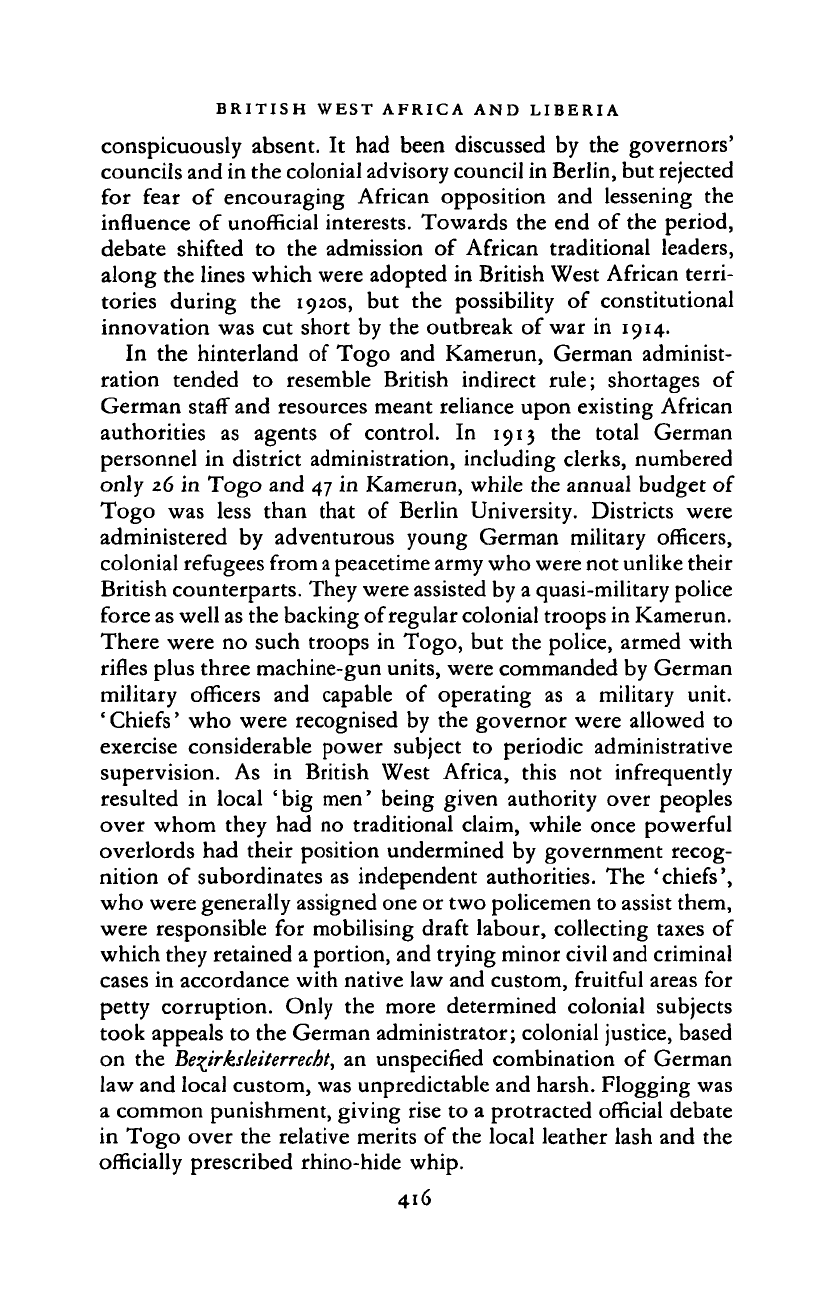
BRITISH WEST AFRICA AND LIBERIA
conspicuously absent.
It
had been discussed by the governors'
councils and in the colonial advisory council in Berlin, but rejected
for fear
of
encouraging African opposition and lessening
the
influence of unofficial interests. Towards the end of the period,
debate shifted
to
the admission
of
African traditional leaders,
along the lines which were adopted in British West African terri-
tories during
the
1920s,
but the
possibility
of
constitutional
innovation was cut short by the outbreak of war in 1914.
In the hinterland of Togo and Kamerun, German administ-
ration tended
to
resemble British indirect rule; shortages
of
German staff and resources meant reliance upon existing African
authorities
as
agents
of
control.
In
1913
the
total German
personnel in district administration, including clerks, numbered
only 26 in Togo and 47 in Kamerun, while the annual budget of
Togo was less than that
of
Berlin University. Districts were
administered
by
adventurous young German military officers,
colonial refugees from
a
peacetime army who were not unlike their
British counterparts. They were assisted by a quasi-military police
force as well as the backing of regular colonial troops in Kamerun.
There were no such troops in Togo, but the police, armed with
rifles plus three machine-gun units, were commanded by German
military officers
and
capable
of
operating
as a
military unit.
' Chiefs' who were recognised by the governor were allowed
to
exercise considerable power subject
to
periodic administrative
supervision.
As in
British West Africa, this
not
infrequently
resulted
in
local 'big men' being given authority over peoples
over whom they had no traditional claim, while once powerful
overlords had their position undermined by government recog-
nition
of
subordinates as independent authorities. The 'chiefs',
who were generally assigned one or two policemen to assist them,
were responsible for mobilising draft labour, collecting taxes of
which they retained a portion, and trying minor civil and criminal
cases in accordance with native law and custom, fruitful areas for
petty corruption. Only the more determined colonial subjects
took appeals to the German administrator; colonial justice, based
on the
Be^irksleiterrecht,
an unspecified combination
of
German
law and local custom, was unpredictable and harsh. Flogging was
a common punishment, giving rise to a protracted official debate
in Togo over the relative merits of the local leather lash and the
officially prescribed rhino-hide whip.
416
Cambridge Histories Online © Cambridge University Press, 2008
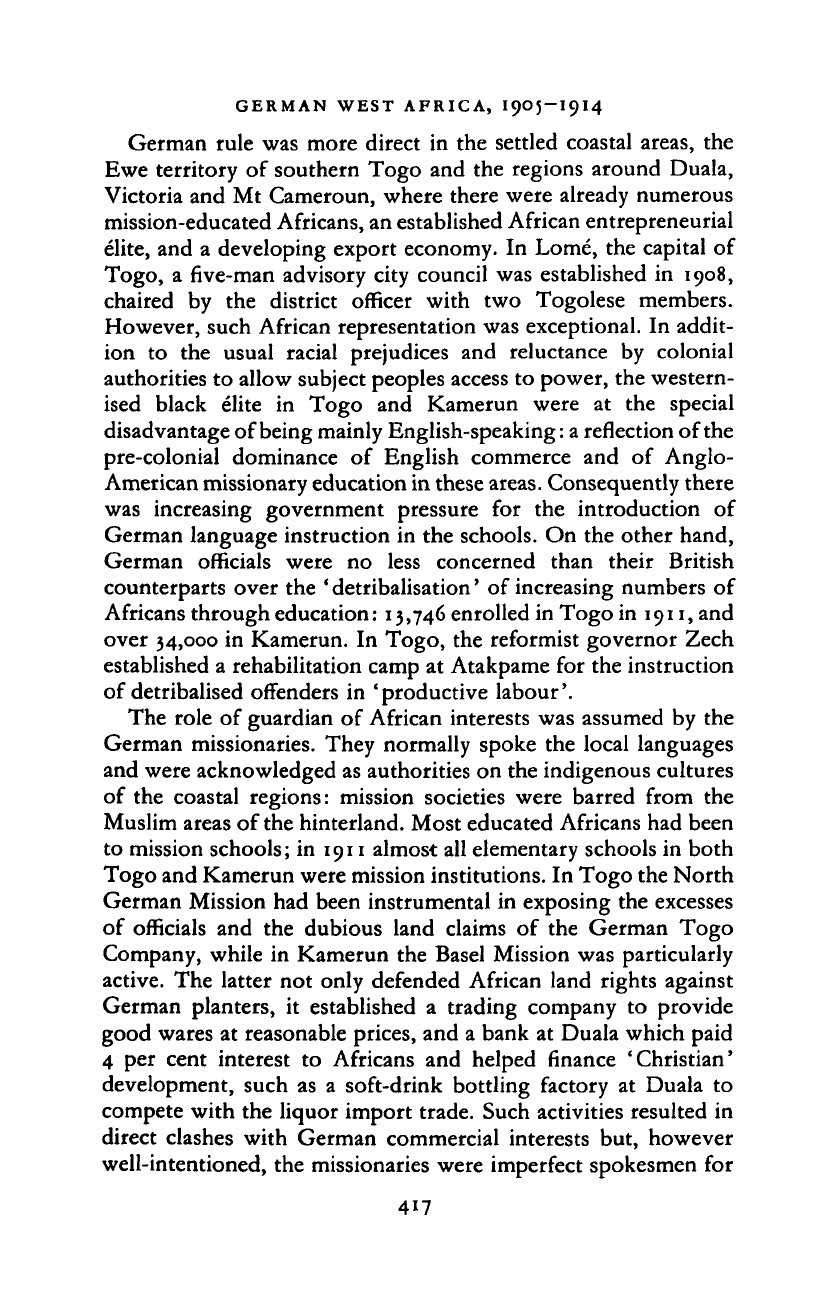
GERMAN WEST AFRICA, 1905-1914
German rule was more direct in the settled coastal areas, the
Ewe territory of southern Togo and the regions around Duala,
Victoria and Mt Cameroun, where there were already numerous
mission-educated Africans, an established African entrepreneurial
elite,
and a developing export economy. In Lome, the capital of
Togo,
a five-man advisory city council was established in 1908,
chaired by the district officer with two Togolese members.
However, such African representation was exceptional. In addit-
ion to the usual racial prejudices and reluctance by colonial
authorities to allow subject peoples access to power, the western-
ised black elite in Togo and Kamerun were at the special
disadvantage of being mainly English-speaking:
a
reflection of the
pre-colonial dominance of English commerce and of Anglo-
American missionary education in these
areas.
Consequently there
was increasing government pressure for the introduction of
German language instruction in the schools. On the other hand,
German officials were no less concerned than their British
counterparts over the ' detribalisation' of increasing numbers of
Africans through education: 13,746 enrolled in Togo in
1911,
and
over 34,000 in Kamerun. In Togo, the reformist governor Zech
established a rehabilitation camp at Atakpame for the instruction
of detribalised offenders in 'productive labour'.
The role of guardian of African interests was assumed by the
German missionaries. They normally spoke the local languages
and were acknowledged as authorities on the indigenous cultures
of the coastal regions: mission societies were barred from the
Muslim areas of the hinterland. Most educated Africans had been
to mission schools; in 1911 almost all elementary schools in both
Togo and Kamerun were mission institutions. In Togo the North
German Mission had been instrumental in exposing the excesses
of officials and the dubious land claims of the German Togo
Company, while in Kamerun the Basel Mission was particularly
active. The latter not only defended African land rights against
German planters, it established a trading company to provide
good wares at reasonable prices, and a bank at Duala which paid
4 per cent interest to Africans and helped finance 'Christian'
development, such as a soft-drink bottling factory at Duala to
compete with the liquor import trade. Such activities resulted in
direct clashes with German commercial interests but, however
well-intentioned, the missionaries were imperfect spokesmen for
Cambridge Histories Online © Cambridge University Press, 2008
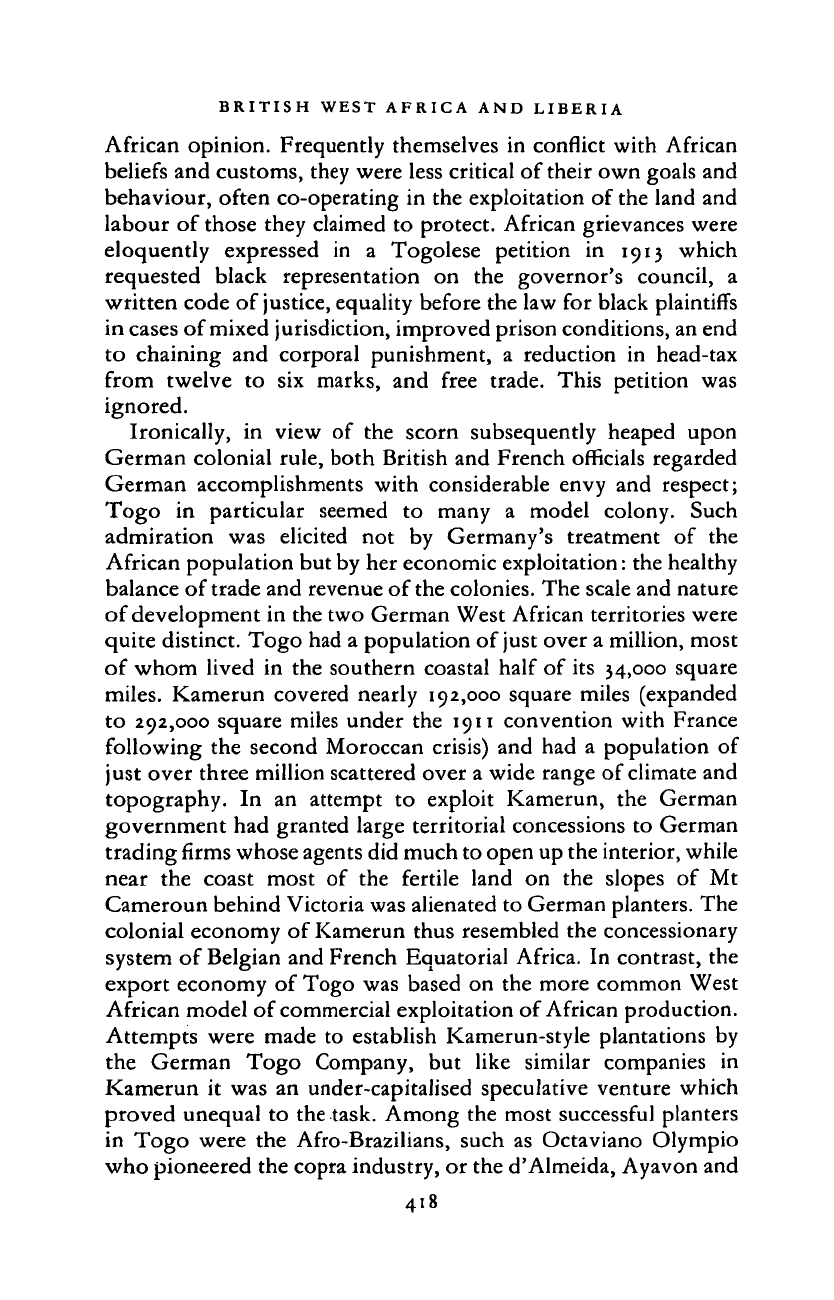
BRITISH WEST AFRICA AND LIBERIA
African opinion. Frequently themselves in conflict with African
beliefs and customs, they were less critical of their own goals and
behaviour, often co-operating in the exploitation of the land and
labour of those they claimed to protect. African grievances were
eloquently expressed
in a
Togolese petition
in
1913 which
requested black representation
on the
governor's council,
a
written code of
justice,
equality before the law for black plaintiffs
in cases of mixed jurisdiction, improved prison conditions, an end
to chaining and corporal punishment,
a
reduction
in
head-tax
from twelve
to six
marks, and free trade. This petition was
ignored.
Ironically,
in
view
of
the scorn subsequently heaped upon
German colonial rule, both British and French officials regarded
German accomplishments with considerable envy and respect;
Togo
in
particular seemed
to
many
a
model colony. Such
admiration
was
elicited
not by
Germany's treatment
of the
African population but by her economic exploitation: the healthy
balance of trade and revenue of
the
colonies. The scale and nature
of development in the two German West African territories were
quite distinct. Togo had a population of just over a million, most
of whom lived
in
the southern coastal half of its 34,000 square
miles.
Kamerun covered nearly 192,000 square miles (expanded
to 292,000 square miles under the 1911 convention with France
following the second Moroccan crisis) and had
a
population of
just over three million scattered over a wide range of climate and
topography.
In an
attempt
to
exploit Kamerun,
the
German
government had granted large territorial concessions to German
trading firms whose agents did much to open up the interior, while
near
the
coast most
of
the fertile land
on the
slopes
of
Mt
Cameroun behind Victoria was alienated to German planters. The
colonial economy of Kamerun thus resembled the concessionary
system of Belgian and French Equatorial Africa. In contrast, the
export economy of Togo was based on the more common West
African model of commercial exploitation of African production.
Attempts were made to establish Kamerun-style plantations by
the German Togo Company,
but
like similar companies
in
Kamerun
it
was an under-capitalised speculative venture which
proved unequal to the task. Among the most successful planters
in Togo were the Afro-Brazilians, such as Octaviano Olympio
who pioneered the copra industry, or the d'Almeida, Ayavon and
418
Cambridge Histories Online © Cambridge University Press, 2008
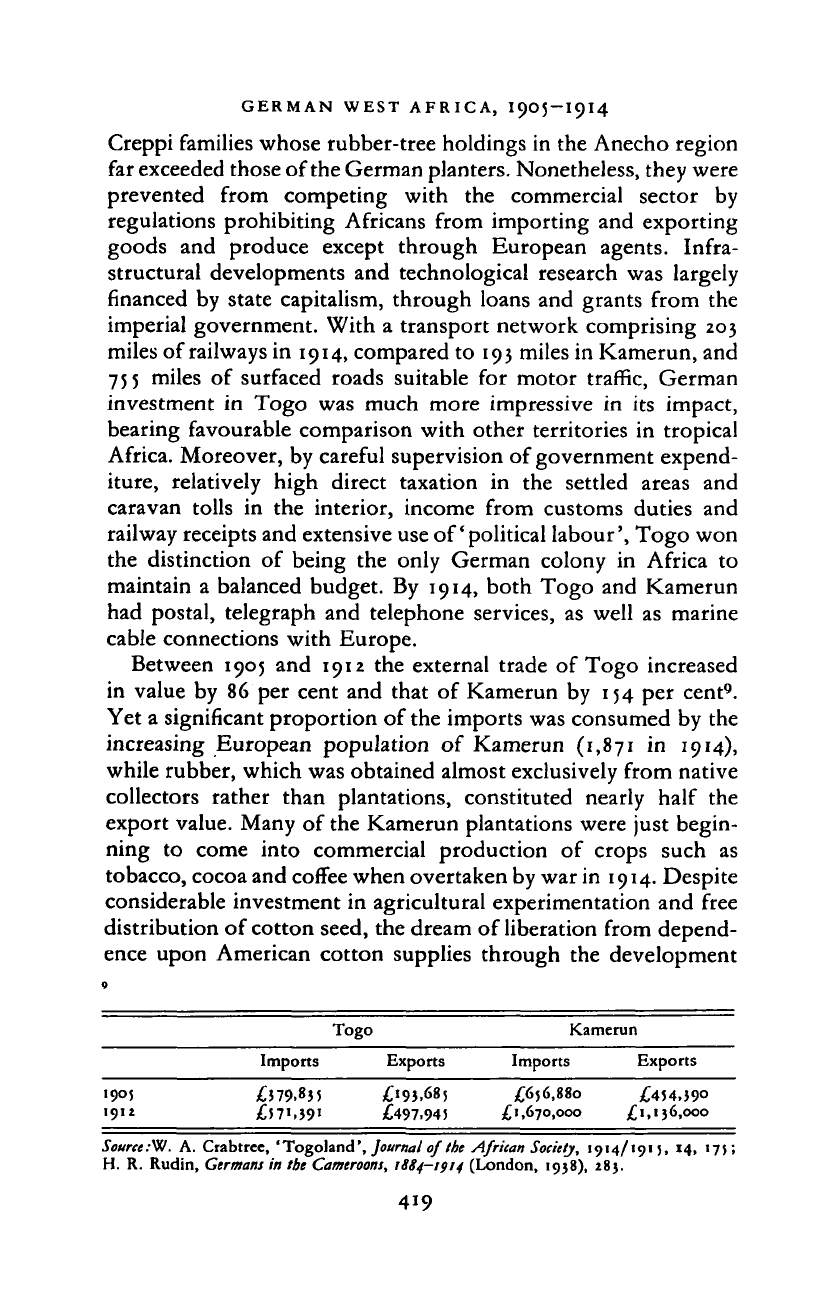
GERMAN WEST AFRICA, I905-I914
Creppi families whose rubber-tree holdings in the Anecho region
far exceeded those of the German planters. Nonetheless, they were
prevented from competing with
the
commercial sector
by
regulations prohibiting Africans from importing
and
exporting
goods
and
produce except through European agents. Infra-
structural developments
and
technological research was largely
financed by state capitalism, through loans and grants from
the
imperial government. With
a
transport network comprising 203
miles of railways in 1914, compared to 193 miles in Kamerun, and
755 miles
of
surfaced roads suitable
for
motor traffic, German
investment
in
Togo was much more impressive
in its
impact,
bearing favourable comparison with other territories
in
tropical
Africa. Moreover, by careful supervision of government expend-
iture,
relatively high direct taxation
in the
settled areas
and
caravan tolls
in the
interior, income from customs duties
and
railway receipts and extensive use of'political labour', Togo won
the distinction
of
being
the
only German colony
in
Africa
to
maintain
a
balanced budget.
By
1914, both Togo and Kamerun
had postal, telegraph
and
telephone services,
as
well
as
marine
cable connections with Europe.
Between 1905
and
1912
the
external trade
of
Togo increased
in value
by 86 per
cent and that
of
Kamerun
by
154
per
cent
9
.
Yet
a
significant proportion
of
the imports was consumed by the
increasing European population
of
Kamerun (1,871
in
1914),
while rubber, which was obtained almost exclusively from native
collectors rather than plantations, constituted nearly half
the
export value. Many
of
the Kamerun plantations were just begin-
ning
to
come into commercial production
of
crops such
as
tobacco, cocoa and coffee when overtaken by war in 1914. Despite
considerable investment
in
agricultural experimentation and free
distribution of cotton seed, the dream of liberation from depend-
ence upon American cotton supplies through
the
development
1905
1912
Imports
£579.855
£571,59'
Togo
Exports
£•93.685
£497.945
Kamerun
Imports
£656,880
£1,670,000
Exports
£454.390
£1,136,000
Source:W.
A.
Crabtree, ' Togoland', Journal
of
the African Society, 1914/191 j,
14, 175;
H.
R.
Rudin, Germans in the
Cameroon!,
1884-1914 (London, 1958),
283.
419
Cambridge Histories Online © Cambridge University Press, 2008
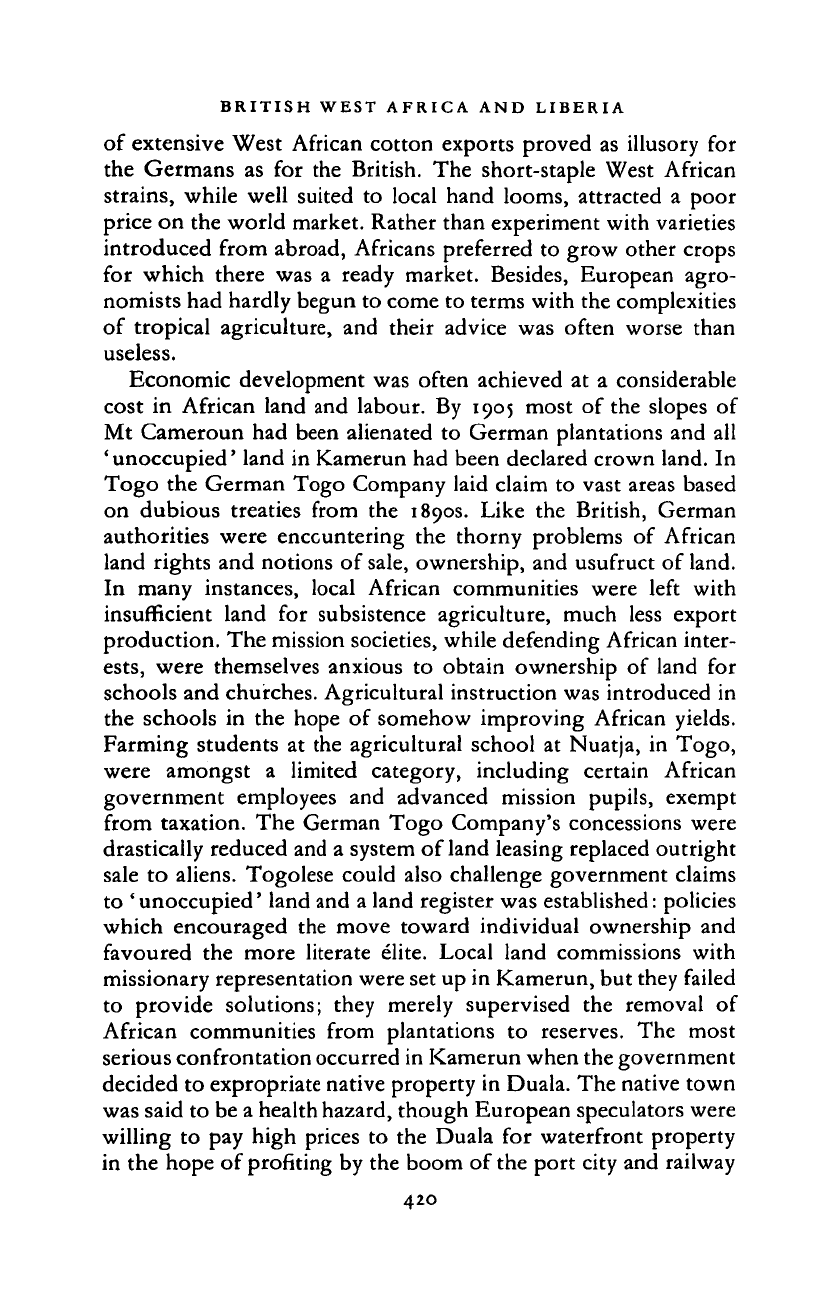
BRITISH WEST AFRICA AND LIBERIA
of extensive West African cotton exports proved as illusory for
the Germans
as for
the British. The short-staple West African
strains, while well suited
to
local hand looms, attracted
a
poor
price on the world market. Rather than experiment with varieties
introduced from abroad, Africans preferred to grow other crops
for which there was
a
ready market. Besides, European agro-
nomists had hardly begun to come to terms with the complexities
of tropical agriculture, and their advice was often worse than
useless.
Economic development was often achieved
at a
considerable
cost
in
African land and labour. By 1905 most of the slopes of
Mt Cameroun had been alienated to German plantations and all
'unoccupied' land in Kamerun had been declared crown land. In
Togo the German Togo Company laid claim to vast areas based
on dubious treaties from the 1890s. Like the British, German
authorities were encountering the thorny problems
of
African
land rights and notions of sale, ownership, and usufruct of land.
In many instances, local African communities were left with
insufficient land
for
subsistence agriculture, much less export
production. The mission societies, while defending African inter-
ests,
were themselves anxious
to
obtain ownership
of
land
for
schools and churches. Agricultural instruction was introduced in
the schools
in
the hope of somehow improving African yields.
Farming students
at
the agricultural school at Nuatja, in Togo,
were amongst
a
limited category, including certain African
government employees and advanced mission pupils, exempt
from taxation. The German Togo Company's concessions were
drastically reduced and a system of land leasing replaced outright
sale to aliens. Togolese could also challenge government claims
to ' unoccupied' land and a land register was established: policies
which encouraged the move toward individual ownership and
favoured the more literate elite. Local land commissions with
missionary representation were set up in Kamerun, but they failed
to provide solutions; they merely supervised
the
removal
of
African communities from plantations
to
reserves. The most
serious confrontation occurred in Kamerun when the government
decided to expropriate native property in Duala. The native town
was said to be a health hazard, though European speculators were
willing to pay high prices to the Duala for waterfront property
in the hope of profiting by the boom of the port city and railway
420
Cambridge Histories Online © Cambridge University Press, 2008
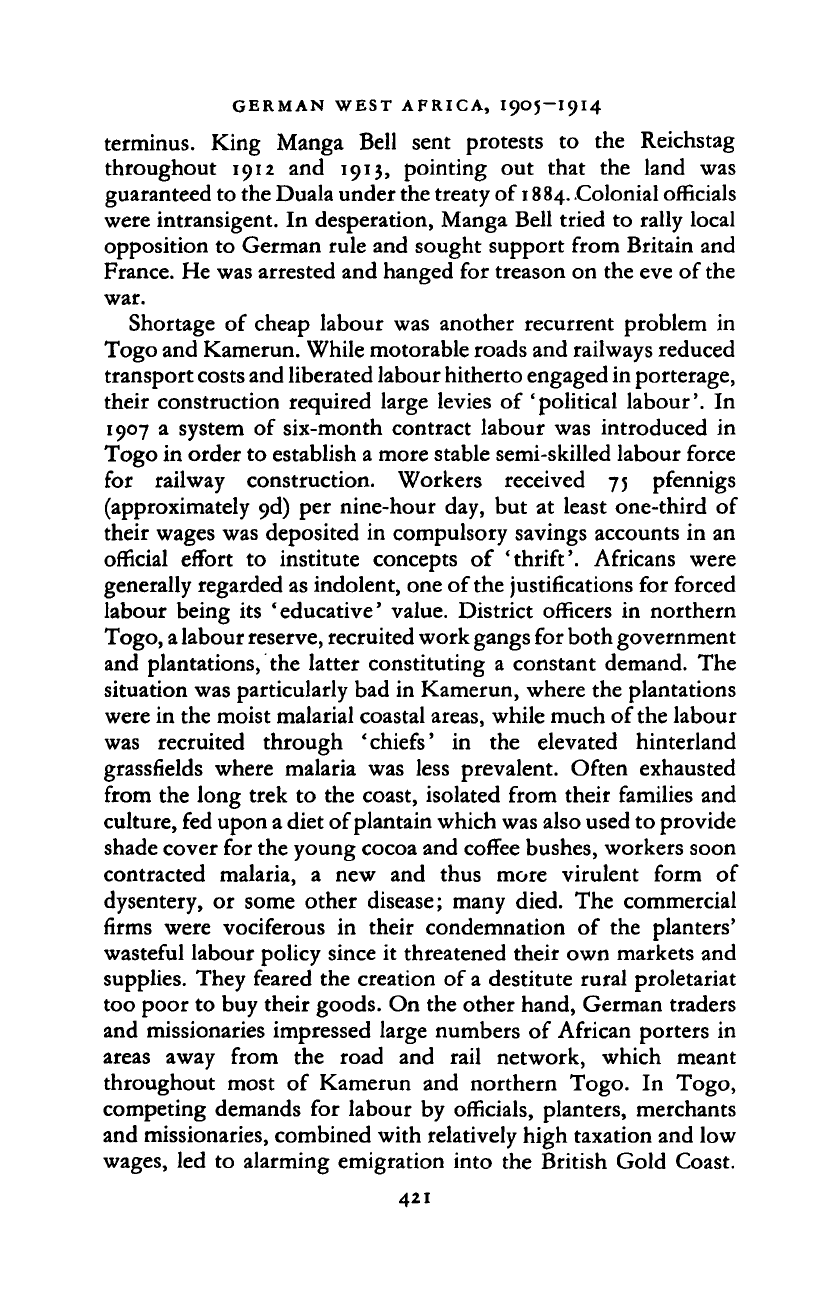
GERMAN WEST AFRICA, 1905-1914
terminus. King Manga Bell sent protests to the Reichstag
throughout 1912 and 1913, pointing out that the land was
guaranteed to the Duala under the treaty of
1884.
.Colonial officials
were intransigent. In desperation, Manga Bell tried to rally local
opposition to German rule and sought support from Britain and
France. He was arrested and hanged for treason on the eve of the
war.
Shortage of cheap labour was another recurrent problem in
Togo and Kamerun. While motorable roads and railways reduced
transport costs and liberated labour hitherto engaged in porterage,
their construction required large levies of 'political labour'. In
1907 a system of six-month contract labour was introduced in
Togo in order to establish a more stable semi-skilled labour force
for railway construction. Workers received 75 pfennigs
(approximately 9d) per nine-hour day, but at least one-third of
their wages was deposited in compulsory savings accounts in an
official effort to institute concepts of 'thrift'. Africans were
generally regarded as indolent, one of the justifications for forced
labour being its 'educative' value. District officers in northern
Togo,
a labour reserve, recruited work gangs for both government
and plantations, the latter constituting a constant demand. The
situation was particularly bad in Kamerun, where the plantations
were in the moist malarial coastal areas, while much of the labour
was recruited through 'chiefs' in the elevated hinterland
grassfields where malaria was less prevalent. Often exhausted
from the long trek to the coast, isolated from their families and
culture, fed upon a diet of plantain which was also used to provide
shade cover for the young cocoa and coffee bushes, workers soon
contracted malaria, a new and thus more virulent form of
dysentery, or some other disease; many died. The commercial
firms were vociferous in their condemnation of the planters'
wasteful labour policy since it threatened their own markets and
supplies. They feared the creation of
a
destitute rural proletariat
too poor to buy their goods. On the other hand, German traders
and missionaries impressed large numbers of African porters in
areas away from the road and rail network, which meant
throughout most of Kamerun and northern Togo. In Togo,
competing demands for labour by officials, planters, merchants
and missionaries, combined with relatively high taxation and low
wages, led to alarming emigration into the British Gold Coast.
421
Cambridge Histories Online © Cambridge University Press, 2008
